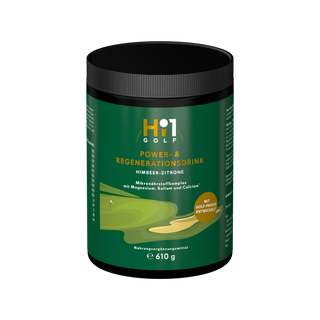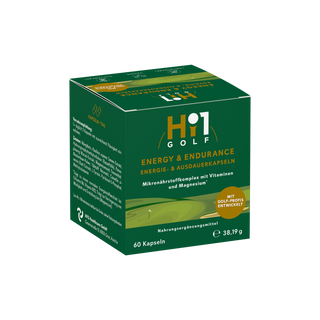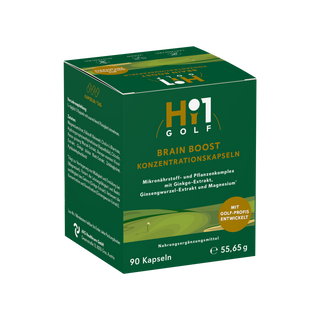What are electrolytes?
Electrolytes are nothing more than electrically charged minerals that are involved in almost all important bodily functions. They regulate fluid balance, the transmission of impulses in muscles and nerves, acid-base balance, and the energy supply to cells. Among the best known are magnesium, potassium, sodium, and calcium.
If electrolyte balance becomes unbalanced, for example due to heavy sweating in hot weather or insufficient fluid intake, the consequences quickly become noticeable: Muscles become fatigued, concentration wanes, circulation weakens, and play suffers. Balancing these substances is especially important during long rounds or on golf trips to warmer climates to maintain a stable level over several hours.
Do golfers really need electrolytes?
Many people underestimate how much they sweat while playing golf. The body loses not only water but also minerals. Even a small loss can impair physical and mental performance. Fatigue, difficulty concentrating, and muscle cramps are typical signs of an incipient electrolyte deficiency.
Especially in hot weather, high humidity, or during longer tournaments, it's worth consuming electrolytes. Ideally, not just when you feel thirsty, but before.
Which electrolytes are particularly important?
Magnesium is especially important for muscle relaxation. A deficiency can lead to cramps or fatigue. Magnesium also plays a role in energy metabolism. Moderate supplementation during longer games can be helpful.
Potassium regulates fluid exchange in cells and supports muscle and nerve function. Potassium needs increase particularly during strenuous physical activity.
Sodium is crucial for water balance. It helps retain fluid in the body and ensures that water from the intestines can be easily absorbed.
Calcium supports muscle contraction and is especially known for its role in bone metabolism. While the body doesn't lose much of it through sweating, daily requirements should still be met, especially for older golfers.
How do electrolytes affect your golf performance?
During any physical activity, the body loses fluids and minerals through sweat. If these aren't replenished, performance decreases. Muscles no longer function optimally, concentration wanes, and it becomes more difficult to maintain precision, especially during the last moments. Electrolytes help break this cycle and keep the body in balance.
A deficiency often becomes apparent gradually: you feel tired more quickly, are more restless, or no longer react as clearly to game situations. This is precisely where electrolyte supplementation can help maintain a consistent level of performance.
When is the right time to take electrolytes while golfing?
Ideally, you should start hydrating properly before your game. Drink a drink containing electrolytes about half an hour before teeing off. During your round, regular, small amounts of fluid are important—a few sips every 20 to 30 minutes, or more in hot weather.
After the game, another serving helps support recovery and replenish energy stores. This way, you can prevent exhaustion the next day and maintain your performance even after several games in a row.
What does the Hi1 GOLF Power & Regeneration Drink offer?
The Hi1 GOLF Power & Recovery Drink was specially developed for the demands of golf. It contains a balanced ratio of the four key electrolytes: magnesium, potassium, calcium, and sodium. This blend supports muscle and nerve function, as well as physical and mental resilience.
The drink also contains vitamin C, which supports the immune system and reduces oxidative stress. It also contains adaptogens, natural plant compounds that help the body cope better with stress and recover faster.
The drink is easy to measure, tastes pleasantly fresh, and can be enjoyed before, during, and after a game. It's especially suitable for hot days, longer rounds, or golf trips.
Are there any risks associated with taking electrolytes?
As with everything, the dose makes all the difference. Those who regularly consume high-quality electrolyte drinks or mineral supplements have nothing to worry about. However, overindulgence or uncontrolled intake can lead to imbalances. For example, too high a potassium level can put a strain on the heart, or too much water without electrolytes can dangerously lower sodium levels.
If you are taking medication, especially blood pressure medication, you should discuss taking electrolytes with your doctor. However, with the correct dosage and use, there are few risks.
Use electrolytes specifically and stay productive
Electrolytes aren't a fad, but a useful part of game preparation and recovery, especially if you play regularly or are out and about in warmer temperatures. They help maintain fluid and mineral balance, promote concentration, and support the muscles in their work.
With the Hi1 GOLF Power & Recovery Drink, you have a high-quality product tailored precisely to these needs. It helps you stay focused, productive, and physically balanced – from the first tee to the last putt.
Because with the right equipment, playing is simply better.









